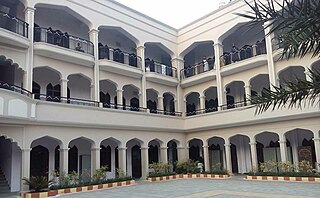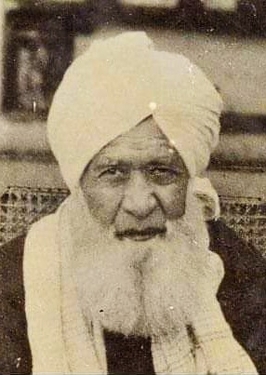Related Research Articles
Manazir Ahsan Gilani was an Indian Sunni Islamic scholar and former Dean of the Faculty of Theology at Osmania University. Some of his notable works include Tadwin-e-Hadith, Muqaddama Tadwin-e-Fiqh, Sawanih-e-Abu Dharr Ghifari, and Sawanih-e-Qasmi. Muhammad Hamidullah, a historian and hadith researcher, was among his students.

Mahmud Hasan Deobandi was an Indian Muslim scholar and an activist of the Indian independence movement, who co-founded the Jamia Millia Islamia University and launched the Silk Letter Movement for the freedom of India. He was the first student to study at the Darul Uloom Deoband seminary. His teachers included Muhammad Qasim Nanautawi and Mahmud Deobandi, and he was authorized in Sufism by Imdadullah Muhajir Makki and Rashid Ahmad Gangohi.

Muhammad Qasim Nanautavi was an Indian Sunni Hanafi Maturidi Islamic Scholar, theologian and a Sufi who was one of the main founders of the Deobandi Movement, starting from the Darul Uloom Deoband.
Muhammad Tayyib Qasmi was an Indian Sunni Islamic scholar who served as Vice Chancellor of Darul Uloom Deoband for more than half a century. He was grandson of Muhammad Qasim Nanautavi, the founder of the Darul Uloom Deoband.
Abul Wafa Sanaullah Amritsari was a British Indian, later Pakistani, Muslim scholar and a leading figure within the Ahl-e-Hadith movement who was active in the city of Amritsar, Punjab. He was an alumnus of Mazahir Uloom and the Darul Uloom Deoband. He was a major antagonist of Mirza Ghulam Ahmad and the early Ahmadiya movement. He served as the general secretary of the All India Jamiat-i-Ahl-i-Hadith from 1906 to 1947 and was the editor of the Ahl-e-Hadees, a weekly magazine.
Murtaza Hasan Chandpuri (1868-1951) was an Indian Sunni Islamic scholar. He was a disciple of Ashraf Ali Thanwi in the Chishti order of Sufism.
Syed Fakhruddin Ahmad (1889-1972) was an Indian Sunni Muslim scholar and jurist who served as the Principal of Madrasa Shahi, and the sixth President of Jamiat Ulama-e-Hind. He was a professor of hadith at the Darul Uloom Deoband.
Izaz Ali Amrohi was an Indian Islamic scholar who served as the second and ninth Grand Mufti of the Darul Uloom Deoband. His book Nafahtul Arab is taught in madrassas including the Darul Uloom Deoband.

Madrassa Shahi is an Islamic seminary in Moradabad, Uttar Pradesh. It was established in 1879 by the poor Muslims of Moradabad under the supervision of Islamic scholar, Muhammad Qasim Nanautawi, who also established the Darul Uloom Deoband. This started as Madrasatul Ghuraba, but gained recognition as Madrasa Shahi. Its first principal was Ahmad Hasan Amrohi.
Aziz-ul-Rahman Usmani was an Indian Sunni Muslim scholar who served as first Grand Mufti of Darul Uloom Deoband. He is best known for his Fatawa Darul Uloom Deoband. His brother was Shabbir Ahmad Usmani.

Mamluk Ali Nanautawi was an Indian Sunni Muslim scholar who served as the Head Teacher of Arabic language at the Zakir Husain Delhi College. His notable students include Muhammad Qasim Nanautawi, Rashid Ahmad Gangohi and Muhammad Yaqub Nanautawi.
Asghar Hussain Deobandi was an Indian Sunni Muslim scholar who co-founded Madrasatul Islah.
Fazlur Rahmān Usmānī was an Indian Muslim scholar and poet who co-founded the Darul Uloom Deoband. He was father of the scholars, Aziz-ur-Rahman Usmani and Shabbir Ahmad Usmani. His grandson Atiqur Rahman Usmani was the founder of Nadwatul Musannifeen.
The Siddiqi family of Nanauta are the descendants of the first Rashidun Caliph, Abu Bakr, based primarily in the town of Nanauta in India. The notable people of this family include Mamluk Ali Nanautawi, Muhammad Qasim Nanautawi, Muhammad Yaqub Nanautawi, Muhammad Tayyib Qasmi, Muhammad Salim Qasmi and Qari Shakir Qasmi.
Ahmad Hasan Amrohi also known as Muhaddith Amrohi within the Deobandi movement; was an Indian Muslim scholar and freedom struggle activist who served as the first principal of Madrasa Shahi in Moradabad. He was an alumnus of Darul Uloom Deoband and among the founding members of Mahmud Hasan Deobandi's Thamratut-Tarbiyat. He was an authorized disciple of Imdadullah Muhajir Makki.

Muhammad Ibrahim Balyawi (1887–1967), also spelt as Muhammad Ibrahim Balliavi, was an Indian Sunni Muslim scholar who served as the 6th Principal of Darul Uloom Deoband. He spent almost 50 years instructing Hadith, Mantiq, Islamic philosophy, and other subjects at Darul Uloom Deoband.
Naseer Ahmad Khan (1918–2010), also written as Maulana Naseer Ahmad Khan and Naseer Ahmad Khan Bulandshahri, was an Indian Islamic scholar and muhaddith. He served as a professor at Darul Uloom Deoband for about sixty-five years, out of which thirty-two years he taught Sahih al-Bukhari.
Syed Ahmad Dehlavi was an Indian Islamic scholar and Muhaddith. He served as the 2nd Principal and Sheikh al-Hadith of Darul Uloom Deoband between 1884 and 1890. Murtaza Hasan Chandpuri was one of his students.
References
Citations
- ↑ Gīlānī, Manāzir Ahsan. Sawānih Qāsmi[Biography of Qāsim] (in Urdu). Vol. 1. Deoband: Maktaba Darul Uloom Deoband. p. 113.
- ↑ Minault, Gail (1982). The Khilafat Movement: Religious Symbolism and Political Mobilization in India. Columbia University Press. ISBN 9780231050722 . Retrieved 5 June 2020.
- 1 2 3 Syed Mehboob Rizwi. History of The Dar al-Ulum Deoband (Volume 2) (PDF). Translated by Prof. Murtaz Husain F. Quraishi (1981 ed.). Idara-e-Ehtemam, Dar al-Ulum Deoband. p. 37-38, 170-174. Retrieved 9 May 2020.
- ↑ Muhammad Tayyib, Qari. Bukhari, Akbar Shah (ed.). 50 Misaali Shaksiyaat[50 Exemplar personalities] (in Urdu) (July 1999 ed.). Deoband: Maktaba Faiz-ul-Qur'an. p. 95.
- 1 2 Ernst, Carl W.; Martin, Richard C. (27 November 2012). Rethinking Islamic Studies: From Orientalism to Cosmopolitanism. Univ of South Carolina Press. ISBN 9781611172317 . Retrieved 9 May 2020.
- ↑ Metcalf, Barbara (December 2012). Husain Ahmad Madani: The Jihad for Islam and India's Freedom. Oneworld Publications. ISBN 9781780742106.
- ↑ Deobandi, Syed Muhammad Miyan. "Differences between Hadhrat Shaikhul Hind and Mohtamims". Silk Letters Movement (PDF). Translated by Muhammadullah Qasmi. Darul Uloom Deoband: Shaikhul Hind Academy. pp. 70–71. Retrieved 9 May 2020.
- 1 2 Muhammad Miyan Deobandi. "Hafiz Muhammad Ahmad". Ulama-e-Haq awr Unke Mujahidana Kaarname (in Urdu). Vol. 1. Deoband: Faisal International. pp. 162–163.
- 1 2 Adrawi 2016, p. 17.
- ↑ Muhammad Shakaib Qasmi; Muhammad Noushad Qasmi (27 August 2023). Aks-e-Ahmad (Biography of Hafiz Muhammad Ahmad) (in Urdu) (May 2014 ed.). Darul Uloom Waqf, Deoband: Hujjatul Islam Academy. pp. 71–95. ISBN 9788192944135.
- ↑ Aks-e-Ahmad (in Urdu). Darul Uloom Waqf: Hujjatul Islam Academy. May 2014. p. 464, 474. Retrieved 6 April 2023.
Bibliography
- Rizwi, Syed Mehboob (1981). History of Dar al-Ulum Deoband. Vol. 2. Translated by Murtaz Hussain F Qureshi (1st ed.). Darul Uloom Deoband: Idara-e-Ehtemam.
- Adrawi, Asir (April 2016). Karwān-e-Rafta: Tazkirah Mashāhīr-e-Hind[The Caravan of the Past: Discussing Indian scholars] (in Urdu) (2nd ed.). Deoband: Darul Muallifeen.